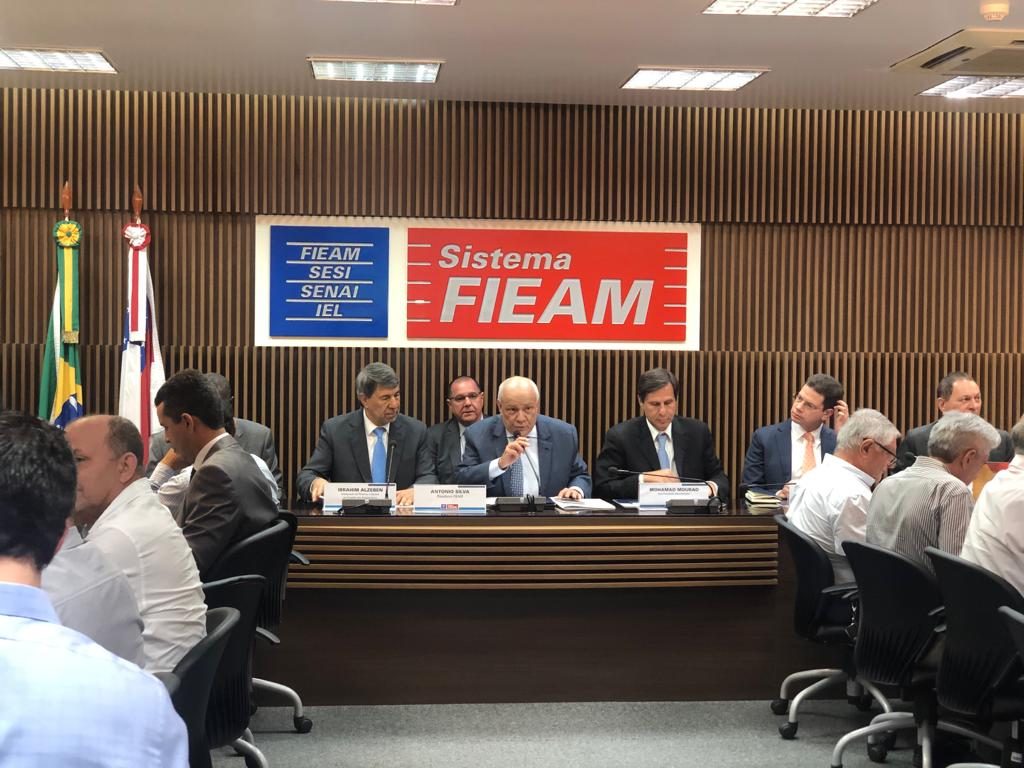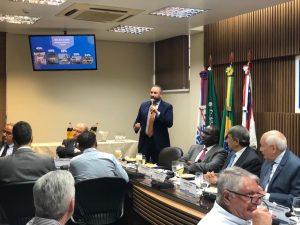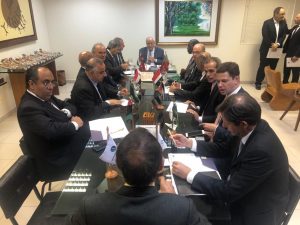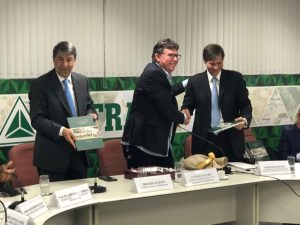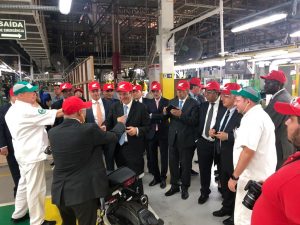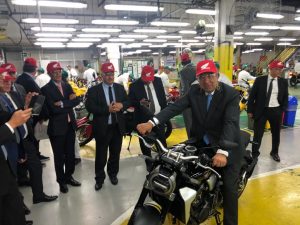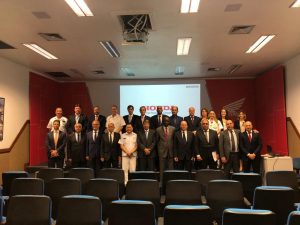Manaus – Businesspeople from Brazil’s Amazonas state showed keen interest in exporting their products to Arab countries during the seminar “Business and Investment Opportunities between Manaus and the Arab countries,” this Monday (11) at the Federation of Industries of the State of Amazonas (Fieam), in Manaus, during a visit of the Council of Arab Ambassadors in Brazil to the state.
Goods including cosmetics, pharmaceuticals, vinegar, non-alcoholic drinks and typical Amazonian items like fibers, fish and açaí show the greatest deal-making promise. Conversely, the ambassadors discussed potential sales of Arab products like olive oil, gum arabic and fertilizer.
Arab Brazilian Chamber of Commerce Administrative vice president Mohamad Mourad (pictured above, on the right), who’s a member of the delegation, said the meeting was key in bringing the businesspeople a step closer to the Arab world. “Many businessmen came to us to exchange business cards at the end of the event. I think three sectors can be quite promising: cosmetics, pharmaceuticals, and local products like açaí and fibers, which have great export appeal, especially among young people,” he said.
Arab Chamber secretary-general Tamer Mansur gave a presentation on Brazilian-Arab trade, emphasizing that the 22 Arab countries combined are the third biggest destination for products from Brazil. “From the state of Amazonas, Arab countries buy lots of gold and electric appliances. The state ranks 20th in exports from Brazil and 12th in imports,” he said.
Presentations were made on companies in different industries, including Aqua Amazon Brazil, for mineral water, which is an Arab Chamber member company and ships product to the UAE; beverage company Real Bebidas; startup cosmetics, phytomedicine and natural food company Biozer; MDS Trade Solutions, which exports Amazonian fish like Tambaqui, Pirarucu and Arowana; natural cosmetics company Pronatus Amazonas; and vinegar company Virrosas.
Fieam chairman Antonio Silva (pictured above, center) said the meeting was “beneficial to interchange between our friendly nations.” League of Arab States ambassador Qais Marouf Kheiro Shqair said there’s a lot of interest in cosmetics – especially anti-aging items – in the Arab countries.
Sudan ambassador Abdelmoneim Ahmed Alamin Elhussain presented gum arabic as a potential product to be imported to Brazil. “Sudan makes 85% of the world’s gum arabic, and it’s widely used in the cosmetics and pharma industries,” he argued.
Brazilian Ministry of Foreign Affairs Middle East Division chief Leandro Silva said Arab culture is an inextricable part of Brazilian culture, and that the outlook for relations keeps improving in the wake of president Jair Bolsonaro’s trip to three Arab countries last October – Qatar, UAE and Saudi Arabia. “Missions like this one are essential to fulfilling that potential. We are interested in increasing the flow of trade and people between our countries,” he said.
“We sustain strong, solid, long-standing relations with Brazil, and we would like to expand those good relations on the basis of mutual respect at all times. May this two-way street grow even stronger,” said the ambassador of Palestine and dean of the Council of Arab Ambassadors in Brazil, Ibrahim Alzeben (pictured above, on the left).
The Arab Brazilian Chamber was named by several ambassadors as the ideal tool for Amazon businesspeople looking to explore the Arab market. “More and more, the Arab Chamber proves its status as a gateway to Arab-Brazilian business,” said Mourad. He called upon local entrepreneurs to attend the Brazil-Arab Countries Economic forum on April 14, 2020.
(Story continues after photo gallery)
Free Zone
This Monday morning, the Arab diplomatic mission visited the headquarters of the Superintendency of the Manaus Free Zone (Suframa) and met with Projects deputy superintendent Gustavo Igreja, Foreign Trade general coordinator Felipe Esteves and other chargés who talked about the benefits that a free zone may offer the companies that establish themselves there, such exemptions and reductions of imports taxes, income taxes, taxes on industrialized goods and others.
The main products manufactured at the free zone are electronic equipment, motorcycles, LCD televisions, GPS devices, and cell phones. Manaus industrial park includes 439 plants and generates over 85,000 direct jobs aiming at reducing inequality and the region’s geographic isolation and fostering development. Companies such as Samsung, LG, Yamaha and Honda are at Manaus industrial park.
Morroco’s ambassador Nabil Adhoghi asked how a tax reform could affect business at the free zone. “A tax reform certainly is a great concern, but the government told us that the competitive edges in the region will not be affected,” said Tavares. Suframa economic and business surveys coordinator Ana Maria Souza reaffirmed Tavares’ answer. “We agree with the tax reform and Bolsonaro administration,” she said.
Souza said only 5% of the goods manufactured in the region are exported, mainly to Colombia, United States and China. “The products we export the most are aluminum and soft drinks extracts and concentrates,” she said. In other words, the Brazilian market is the most served by the companies established in Manaus.
Felipe Esteves believes that agreements such as Mercosur-Egypt free trade deal cause the parties to have preferred access to the products in the free zone. “In Mercosur-Egypt agreement’s case, there’s a gradual tariff reduction program in place since 2017 as well as an approval list from Egypt to Mercosur and from Mercosur to Egypt, and the free zone is encompassed in the preferred access conditions, which makes the flow easier between the countries,” he explained.
Egypt’s new ambassador Wael Ahmed Kamal Aboul Magd, who’s been in the country for just one week, was part of the delegation. He asked if there are any priority sectors that may benefit from the free zone. “There’s no priority sectors, everyone is welcome. Only five products don’t have the free zone’s tax exemptions: tobacco, alcohol, some cosmetics preparations, and guns and ammunition,” said Souza.
“Manaus free zone was created 52 years ago with the goal to incorporate this region of the country and bring development, and we have to make for the logistics with tax incentives to bring companies here,” said Tavares.
Honda
The ambassadors visited Honda’s motorcycle plant, which is the brand’s largest and most verticalized plant in the word and has been established in the free zone since 1976. It produces motorcycles, ATVs, and stationary engines. “Honda always try to manufacture where there’s a market,” said the plant’s vice president Julio Koga. He said that, each year, 950,000 motorcycles are produced and exported to more than 60 countries in the Middle East, Africa, South America and Oceania.
Other participants of the delegation are the ambassadors of Mauritania, Wagne Abdoulaye; Tunisia, Mohamed Hedi Soltani; and chargés d’affaires of the embassy of Jordan, Mutazz Khasawneh, and Libya, Osama Ibrahim Ayad Sawan. The Arab Palestinian Society of Amazonas president Mamoun Yousef Abdel Hameed and Arab Chamber institutional relations analyst Danielle Berini were also at the meetings.
This Tuesday will see a meeting between the diplomats and the governor of Amazonas, Wilson Lima (PSC).
Translated by Gabriel Pomerancblum & Guilherme Miranda



